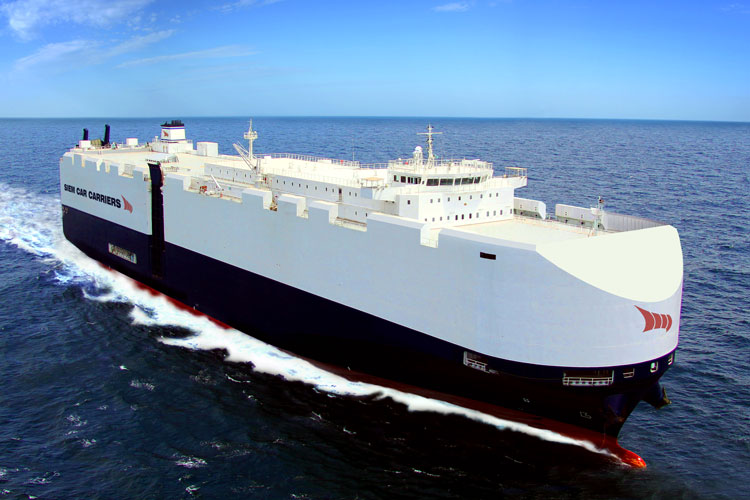In a move to optimize ist »carbon footprin[ds_preview]t«, the German Volkswagen Group as one of the first automakers decides to use LNG-powered vessels for the marine transport of vehicles.
From 2019, Volkswagen Group Logistics charters two vessels from Siem Car Carriers AS. With a length of 200 m and a capacity of about 4,500 vehicles, they will be used between Europe and North America. The changeover of other conventionally powered freighters to LNG drive systems is under consideration, Volkswagen announced.
In addition, the Group intends to transfer vehicle and material transport in Europe increasingly from trucks to lower-emission means of transport such as ships in the future. The use of LNG-powered roll on/roll off car carriers on other routes is also currently being considered. The car carriers of Siem, equipped with a 3,000 m³ LNG tank installed below deck, will have a comparable capacity to conventional transatlantic freighters. Both ships will feature a 12,600 kW engine developed by MAN Diesel & Turbo. They will replace two of the nine conventional freighters powered by heavy fuel oil from 2019 onwards. These are used exclusively for the Volkswagen Group in a round trip scheme across the North Atlantic serving the markets of Canada, the USA, Mexico and Europe.
According to Volkswagen, the use of the two LNG-powered freighters will reduce emissions per ship and year by up to 25% in the case of CO2, up to 30% in the case of NOx, and up to 60% in the case of particulate matters (PM), while SOx emissions will be cut by as much as 100%. Emissions would be further reduced by the use of a highly advanced dual-fuel marine engine with direct injection and exhaust gas treatment. Thomas Zernechel, Head of Group Logistics, says: »The possibility of changing other vehicle transport vessels chartered by Volkswagen over to LNG operation will depend on the availability of the necessary infrastructure.«
The group stated that it joined the Clean Shipping Network at the beginning of 2014 and was the first German automaker to use this index for assessing the environmental impact of marine transport. »We are working steadily on alternative, environmentally compatible transport possibilities, not only for vehicle logistics, but also for material logistics. Since the end of 2015, material from Turkey for the Autoeuropa plant in Portugal has been shipped from Izmir to Lisbon by sea. The transfer from road haulage to marine transport on this route cuts annual CO2 emissions by 240 tons.«

















